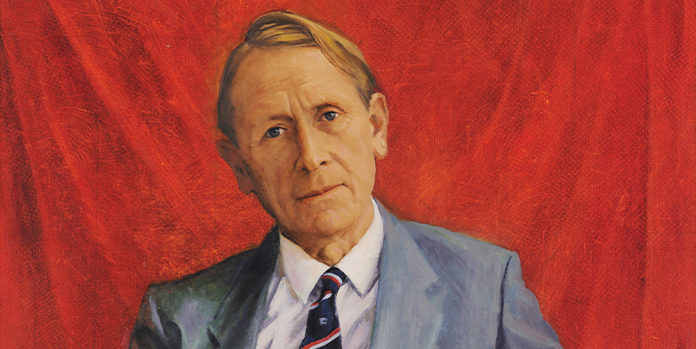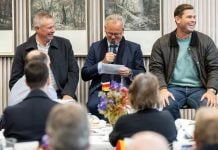
Throughout Melbourne’s Diamond Creek, residents still share stories about beloved general practitioner Dr Donald Cordner (OM 1939), who touched countless lives during almost 50 years of practice.
What his patients may not realise is that Cordner’s dedication led him to give up his stellar career with the Melbourne Football Club, and that his commitment to serving others extended well beyond the boundaries of his bushland suburb.
A moment of choice
Cordner was a keen sportsman from his earliest days at Melbourne Grammar School, earning colours in cricket, athletics, and football. According to his U15 football team report: “The most consistently good player throughout the season was D. Cordner, who was always invaluable in the ruck.”
This love of football continued during Cordner’s time as a medical student at the University of Melbourne, playing for the University team from 1940. In 1941, he played his first VFL game for Melbourne Football Club – the second being the following week in the winning grand final team – and going on to win best and fairest in 1943.
Three years later in 1946, while completing his residency at the Royal Melbourne Hospital and commencing work as a general practitioner in Diamond Creek, Cordner made history as the first (and only) amateur player to be awarded the Brownlow Medal—an achievement that challenged his humble nature.
Cordner took on the captaincy of Melbourne FC in 1948, leading the team to the VFL premiership in that year. He did not relish being in the spotlight because of his football. “Dad was, in my view unnecessarily, a bit uncomfortable with the plaudits his football earned him,” explains son Stephen Cordner (OM 1970). “He felt his winning the Brownlow, in particular, attracted much more attention and praise than the thing deserved.”
After just two years as Captain of Melbourne FC, Cordner chose to step down from the role, and then away from playing a year later. While he may have had a natural talent for the sport, his passion was medicine, and the needs of his community called.
Compassion combined with a “get it done” attitude
More than a decade after Cordner’s death in 2009, Diamond Creek residents still remembered how his care—sometimes provided entirely for free—changed lives.
“Once, Dad was visiting a new single mother whose power had been cut off,” says son Chris Cordner (OM 1967). “It was a matter of course for him to drive 12 miles to Heidelberg to have the power reconnected and to pay for her next two months of electricity.
“Then there was the day he played the First Semi- Final against Geelong, which he did on almost no sleep, having spent the early hours fulfilling his promise to be there when a nervous mother gave birth to her second child. He ran into the change rooms just as the team was running onto the ground.” This was the day he realised he had to give up football.
Serving the community beyond his medical career
Cordner’s responsibility to others continued to shine through during his membership with the Melbourne Cricket Club Committee, which he continued for more than 28 years including seven years as President.
As a new member in the mid-1960s, Cordner made the suggestion that members’ wives be invited to the traditionally all-male Christmas dinner. “He was met with a stunned silence, but eventually he got it to happen,” says Chris. “He didn’t just do these things out of duty—he had a strong sense of what was right, and what should be done.” This same sense led him to lead the introduction of womens’ admission to MCC membership through the Committee.
Cordner’s service to his community also included direct support of Melbourne Grammar through almost 20 years as a crucial member of the School Council, with five as Chair. In 1996, he co-founded (with Free Strickland AM OBE KStJ (OM 1937)), and became one of the first members of, the Witherby Tower Society, cementing his already significant contribution to the ongoing life of the School.
Above all, Cordner’s children remember him as a devoted and loving father. “I remember him coming to my hockey matches when I hardly touched the ball, and he always made me feel like I was an important part of the team,” says daughter Jenny MacNeil. “He was truly dedicated to his community, but his family was always his highest priority.”
Central to this, his children agree, was his wife Moyle, their mother, who was a completely equal member of an extraordinary partnership with her husband lasting more than 60 years. As Cordner himself often said, her wise, loving and soundly-practical support was crucial in everything he did.
Donald Cordner – a snapshot
Professional life and leadership
- General practitioner in Diamond Creek for 46 years (1946 – 1992)
- Member of Melbourne Grammar School Council (1973 – 1989)
- Chair of Melbourne Grammar School Council (1984 – 1989)
- With Free Strickland, first Patron of Witherby Tower Society (1996)
- Member of Melbourne Cricket Club (MCC) Committee (1964 – 1992)
- President of Melbourne Cricket Club (1985 – 1992)
Football history
- Played 166 VFL games for Melbourne FC (1941 – 1950) as an amateur, 144 in a row (1942 – 1950)
- Won two VFL premierships (1941, 1948)
- Only amateur to ever win the Brownlow Medal (1946)
- Captain of Melbourne FC (1948 – 1949)
Community recognition
- Cordner—Eggleston Cup named in his honour (1989)
- Cordner Physical Education Centre at Grimwade House named in his honour (1991)
- Awarded Victorian of the Year (1993)
- Cordner Entrance to the Members’ Stand of the MCG named in his honour (1993)


